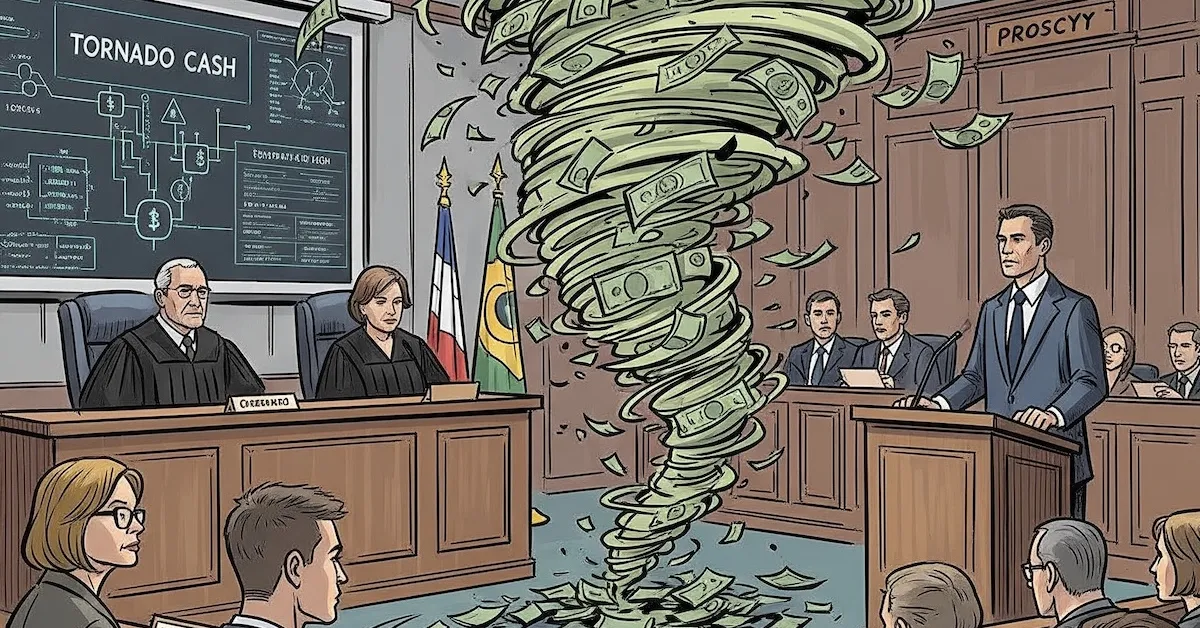Tornado Cash Verdict Rocks Crypto World: Developer Found Guilty!

The Tornado Cash trial, centered on co-founder Roman Storm, carried profound implications for developers of noncustodial Bitcoin and crypto technology, as well as for privacy-preserving software. Amanda Tuminelli, executive director and chief legal officer for the DeFi Education Fund, closely observed these high stakes. She provided an overview of the three charges levied against Storm, with a deep dive into the conspiracy to operate an unlicensed money transmitting business charge. Tuminelli, an expert on 18 U.S. Code § 1960, the U.S. federal law prohibiting unlicensed money transmitting businesses, argued that Storm had not violated this statute in creating and operating Tornado Cash, a crypto mixing service built on Ethereum.
Discussions during the trial and related analyses also touched upon the CLARITY Act and the Blockchain Regulatory Certainty Act (BRCA). Both pieces of legislation include language designed to protect developers of “non-controlling” (noncustodial) crypto technology, stipulating that such developers do not require a money transmitting license and should not be subject to existing money transmission laws. Tuminelli further highlighted concerns regarding the Department of Justice’s (DoJ) shift away from 2019 FinCEN guidance, positing that this change threatens innovation within the crypto space. She suggested it might create a scenario where the U.S. government continues to press charges on developers like Storm, despite an April memo from U.S. Deputy Attorney General Todd Blanche stating the DoJ would cease targeting crypto entities, including mixing services, for the acts of their end users.
The trial itself concluded in the Southern District of New York (SDNY) with Roman Storm being found guilty on the second count of his indictment: conspiracy to operate an unlicensed money transmitting business. This verdict, arrived at by the jury after three and a half days of deliberation and following a trial that began in mid-July, means Storm now faces up to five years in prison. The jury, however, did not reach a unanimous verdict on the other two counts, which included conspiracy to commit money laundering and conspiracy to violate sanctions.
Following the issuance of the verdict, the prosecution made a motion to remand Storm into custody, asserting he was a flight risk. Judge Failla rejected this motion, swayed by the defense’s arguments. The defense emphasized Storm’s strong ties to the United States, including his home in Washington state being tied up in a $2 million bail bond, his daughter (of whom he has partial custody) and girlfriend being U.S.-based, and his parents holding green cards. Furthermore, the defense pointed out that much of the crypto community supporting Storm is based in the U.S. and is expected to continue their support as he appeals the verdict. While the prosecution argued that Storm now had more incentive to flee post-conviction, the judge was not convinced, noting that the “stability of the verdict is still in play” (likely referencing the impending appeal) and that his “incentives have shifted tremendously,” before denying the remand motion.
Shortly after the verdict, U.S. Attorney for the SDNY Jay Clayton issued a statement. Clayton asserted that “Roman Storm and Tornado Cash provided a service for North Korean hackers and other criminals to move and hide more than $1 billion of dirty money,” adding that the promise of digital assets “cannot be an excuse for criminality.” He emphasized the commitment of his office and partner agencies to hold accountable those who exploit emerging technologies for crime. Notably, Clayton's statement did not acknowledge U.S. Deputy Attorney General Todd Blanche's memo regarding the DoJ’s intent to “stop participating in regulation by prosecution” in the crypto space, nor did it mention that the vast majority of funds moved through Tornado Cash users were not proven to have been obtained illicitly. The outcome of this trial sets a significant precedent for the future of noncustodial crypto technology and privacy-preserving software development.
You may also like...
Why Do Africans Become More African After Leaving Africa?

Why do Africans abroad suddenly embrace their roots with pride? From Afrobeats in London to Yoruba weddings in New York,...
Boxing Icon's Son in Legal Turmoil: Julio Cesar Chavez Jr. Faces Cartel Allegations & Deportation Drama!

Mexican boxer Julio César Chávez Jr. has been deported from the U.S. to Mexico, where he was immediately jailed for alle...
Super Falcons Make History: Nigeria Crowned WAFCON Champions for 10th Time in Thrilling Win!
)
Nigeria's Super Falcons made history by clinching their 10th Women's Africa Cup of Nations title with a spectacular 3-2 ...
Paolo Sorrentino's 'La Grazia' Dazzles Venice, Earns Raves

Paolo Sorrentino's latest film, 'La Grazia,' captivated the Venice Film Festival, earning a four-minute standing ovation...
KPop Demon Hunters Ignites Oscar Buzz, Captivates Audiences

The animated film "KPop Demon Hunters" has emerged as a record-breaking global phenomenon, topping Netflix viewership ch...
Naira Marley Breaks Silence: Explosive Defense in Mohbad Case Rocks Nigeria!

Naira Marley has released a documentary sharing his side of the story regarding the tragic death of his former signee, M...
Fans Buzzing as Reading & Leeds Festival Teases Major Secret Headliners!

Anticipation is high for the 2025 Reading and Leeds Festivals, with widespread rumors of secret sets from bands like Wol...
Britpop Backlash: Oasis Reunion Fuels Fan Fury, Ticketmaster Under Fire!

Oasis is set to embark on a highly anticipated reunion tour with Andy Bell confirming his involvement, playing 41 dates ...